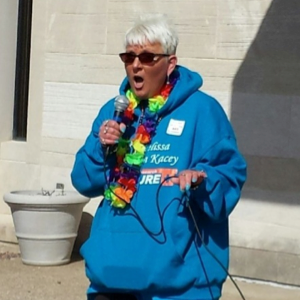
I was diagnosed in January 2009 with multiple sclerosis, and within a few months, it evolved into the secondary progressive form. My general practitioner said she had never seen anybody with MS have their symptoms become so severe so quickly. Within a year after my diagnosis, I was falling all the time, bumping into walls, sleeping 16 hours a day. I wasn’t able to bathe or dress myself. And I wasn’t able to walk unaided—I used a wheelchair or a walker. My symptoms were so severe that in 2011, I decided my only alternative was to leave my home with my husband and move in with my parents, who had the time to care for me 24 hours a day.
But I’ve never stopped believing that research is going to be the key for this disease. In 2014, I joined a 26-month double-blind clinical study, funded by the National MS Society, for a promising new medication. My hopes weren’t very high that the study would do anything for my symptoms, since I didn’t even know if I would receive the study medication or a placebo. Mainly what I was hoping for was that the research could be used to help other people. My study site was at Vanderbilt University, which is an hour and a half drive from my home, so it wasn’t easy for me to participate. But I was willing to go through anything if it meant finding the answer for people with MS.
I never expected I would have the results I have had from the study. Now, as a result of the medication, I can walk a mile and half three times a week. I can do everything but drive. And I’ve moved back home with my husband.
Research has had such a personal effect on my life that I never stop challenging people to get involved in MS research in any way they can. But even if you don’t personally benefit from a clinical trial, I think research is still important. It’s the key to finding a cure for this disease. We need to keep trying and trying and trying until we find an answer.
Outside of clinical trials, there are all kinds of ways to become involved in MS research. For the last five years, I’ve been a Walk MS: River Valley team captain in southern Indiana. I try to encourage everyone, whether they have MS or not, to come out and walk. We have a potluck after our walk each year—we have a really good time, and people look forward to it. In the last two years, we’ve raised $4,700 for MS research. We sell t-shirts too, and on the back of our shirts this year was the logo “Research is the Key to the Cure.”
I really believe that, and I’m willing to do anything I can to encourage other people to support MS research. I like to give people hope because research has made such a difference in my life. I tell everyone I meet to not give up, because eventually we will find a cure.